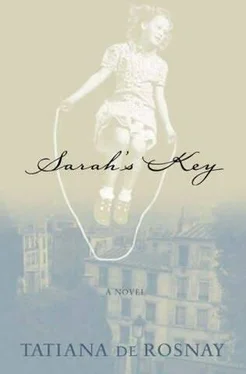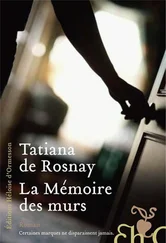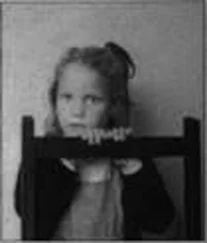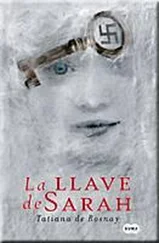Sarah let her mind go blank. She didn’t want to think of what might happen. She did not feel strong enough to visualize it. She let her thoughts stray. She thought of the cat they used to have, a cat that made her sneeze. What was the cat’s name? She couldn’t remember. Something silly like Bonbon or Réglisse. They gave it away because it made her nose tickle and her eyes go red and swollen. She had been sad, and Michel had cried all day. Michel had said it was all her fault.
The man held out a blasé palm. Jules handed him the identity cards in an envelope. The man looked down, shuffled through it, eyes shooting up at Jules, then at Geneviève. Then he said:
“The child?”
Jules pointed to the cards.
“The child’s card is there, Monsieur. With ours.”
The man opened the envelope wider with a deft thumb. A large banknote folded into three appeared at the bottom of the envelope. The man did not budge.
He looked down again at the money, then at Sarah’s face. She looked back at him. She did not cower or plead. She simply looked at him.
The moment seemed to drag on, endless, like that interminable minute when the man had finally let her go from the camp.
The man gave a curt nod. He handed the cards back to Jules and pocketed the envelope with a fluid gesture. Then he stood aside to let them pass.
“Thank you, Monsieur,” he said. “Next person, please.”

CHARLA’S VOICE ECHOED INTO my ear. “Julia, are you serious? He can’t have said that. He can’t put you into that situation. He has no right.”
It was the lawyer’s voice I was hearing now, the tough, pushy Manhattan lawyer who wasn’t afraid of anything, or anyone.
“He did say that,” I replied, listless. “He said it would be the end of us. He said he would leave me if I kept the baby. He says he feels old, that he can’t deal with another child, that he just doesn’t want to be an old dad.”
There was a pause.
“Does this have anything to do with the woman he had the affair with?” asked Charla. “I can’t remember her name.”
“No. Bertrand did not mention her once.”
“Don’t let him pressure you into anything, Julia. This is your child, too. Don’t ever forget that, honey.”
All day long, my sister’s sentence had echoed within me. “This is your child, too.” I had spoken to my doctor. She had not been surprised at Bertrand’s decision. She had suggested that maybe he was going through a midlife crisis. That the responsibility of another child was too much for him to bear. That he was fragile. It happened to many men coming up to fifty.
Was Bertrand really going through a crisis? If that was the case, I had not seen it coming. How was that possible? I simply thought he was being selfish, that he was thinking of himself, as usual. I had told him that, during our talk. I had told him everything that was on my mind. How could he impose abortion after the numerous miscarriages I had gone through, after the pain, the crushed hope, the despair? Did he love me? I had asked, desperate. Did he truly love me? He had looked at me, nodding his head. Of course he loved me. How could I be so stupid? he had said. He loved me. And his broken voice came back to me, the stilted way he had admitted his fear of growing old. A midlife crisis. Maybe the doctor was right, after all. And maybe I hadn’t realized it because I had so many things on my mind in the past few months. I felt totally lost. Incapable of dealing with Bertrand and his anxiety.
My doctor had informed me I did not have much time to make my mind up. I was already six weeks pregnant. If I was to abort, I would have to do it within the next two weeks. Tests had to be done, a clinic had to be found. She suggested we talk about it, Bertrand and I, with a marriage counselor. We had to discuss it, we had to bring it out into the open. “If you abort against your will,” my doctor had pointed out, “you will never forgive him. And if you don’t, he has admitted to you how much this is an intolerable situation for him. This all needs to be worked out, and fast.”
She was right. But I could not bring myself to speed things up. Every minute I earned was sixty seconds more for this child. A child I already loved. It wasn’t even bigger than a lima bean and I loved it as much as I loved Zoë.
I went to Isabelle’s place. She lived in a small, colorful duplex on the rue de Tolbiac. I felt I just couldn’t come home from the office and wait for my husband’s return. I couldn’t face it. I called Elsa, the babysitter, and asked her to take over. Isabelle made me some crottin de chavignol toasts and threw together a quick, delicate salad. Her husband was away on a business trip. “OK, cocotte,” she said, sitting in front of me and smoking away from me, “try to visualize life without Bertrand. To imagine it. The divorce. The lawyers. The aftermath. What it would do to Zoë. What your lives will be like. Separate homes. Separate existences. Zoë going from you to him. From him to you. No longer a real family. No longer breakfast together, Christmas together, vacations together. Can you do this? Can you imagine this?”
I stared at her. It seemed unthinkable. Impossible. And yet, it happened so often. Zoë was practically the only child in her class with parents who’d been married for fifteen years. I told Isabelle I couldn’t talk about it anymore. She offered me some chocolate mousse and we watched Les Demoiselles de Rochefort on her DVD player. When I got home, Bertrand was in the shower and Zoë in the land of Nod. I crawled into bed. My husband went to watch television in the living room. By the time he got to bed, I was fast asleep.
Today was “visiting Mamé” day. For the first time, I nearly telephoned to cancel. I felt drained. I wanted to stay in bed and sleep all morning. But I knew she would be waiting for me. I knew she would be wearing her best gray-and-lavender dress and her ruby lipstick and her Shalimar perfume. I couldn’t let her down. When I turned up just before noon, I noticed my father-in-law’s silver Mercedes parked in the courtyard of the nursing home. That unnerved me.
He was here because he wanted to see me. He never came to visit his mother at the same time as me. We all had our specific schedules. Laure and Cécile came on weekends, Colette on Monday afternoons, Edouard on Tuesdays and Fridays, I generally came on Wednesday afternoons with Zoë, and alone on Thursdays at midday. And we each stuck to our schedules.
Sure enough, there he was, sitting very straight, listening to his mother. She had just finished her lunch, always served ridiculously early. I felt nervous, all of a sudden, like a guilty schoolgirl. What did he want with me? Couldn’t he just pick up his phone and call me if he wanted to see me? Why wait till now?
Masking all resentment and anxiety behind a warm smile, I kissed him on both cheeks and sat next to Mamé, taking her hand, as I always did. I half expected him to leave, but he stayed on, watching us with a genial expression. It was uncomfortable. I felt like my privacy had been invaded, that every single word I said to Mamé was listened to and judged.
After half an hour, he got up, glancing at his watch. He darted a strange smile at me.
“I need to talk to you, Julia, please,” he murmured, lowering his voice so that Mamé’s old ears wouldn’t hear. I noticed he seemed nervous all of a sudden, shuffling his feet, glancing at me with impatience. So I kissed Mamé farewell and followed him to his car. He made a motion for me to get in. He sat down next to me, fingered the keys, but did not turn on the ignition. I waited, surprised by the anxious movement of his fingers. The silence thrived, full and heavy. I looked around us at the paved courtyard, watching nurses wheel helpless old people in and out of the premises.
Читать дальше












